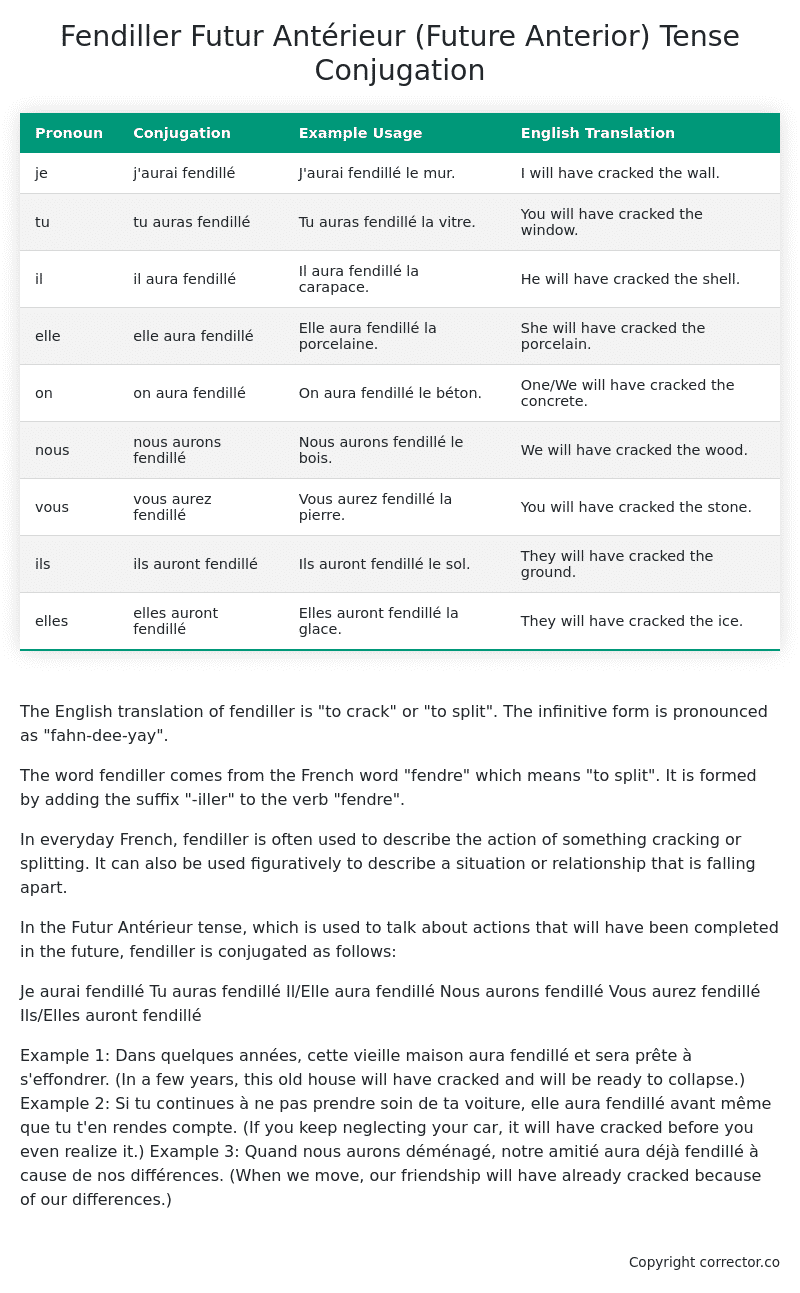Futur Antérieur (Future Anterior) Tense Conjugation of the French Verb fendiller
Introduction to the verb fendiller
The English translation of fendiller is “to crack” or “to split”. The infinitive form is pronounced as “fahn-dee-yay”.
The word fendiller comes from the French word “fendre” which means “to split”. It is formed by adding the suffix “-iller” to the verb “fendre”.
In everyday French, fendiller is often used to describe the action of something cracking or splitting. It can also be used figuratively to describe a situation or relationship that is falling apart.
In the Futur Antérieur tense, which is used to talk about actions that will have been completed in the future, fendiller is conjugated as follows:
Je aurai fendillé
Tu auras fendillé
Il/Elle aura fendillé
Nous aurons fendillé
Vous aurez fendillé
Ils/Elles auront fendillé
Example 1: Dans quelques années, cette vieille maison aura fendillé et sera prête à s’effondrer. (In a few years, this old house will have cracked and will be ready to collapse.)
Example 2: Si tu continues à ne pas prendre soin de ta voiture, elle aura fendillé avant même que tu t’en rendes compte. (If you keep neglecting your car, it will have cracked before you even realize it.)
Example 3: Quand nous aurons déménagé, notre amitié aura déjà fendillé à cause de nos différences. (When we move, our friendship will have already cracked because of our differences.)
Table of the Futur Antérieur (Future Anterior) Tense Conjugation of fendiller
| Pronoun | Conjugation | Example Usage | English Translation |
|---|---|---|---|
| je | j’aurai fendillé | J’aurai fendillé le mur. | I will have cracked the wall. |
| tu | tu auras fendillé | Tu auras fendillé la vitre. | You will have cracked the window. |
| il | il aura fendillé | Il aura fendillé la carapace. | He will have cracked the shell. |
| elle | elle aura fendillé | Elle aura fendillé la porcelaine. | She will have cracked the porcelain. |
| on | on aura fendillé | On aura fendillé le béton. | One/We will have cracked the concrete. |
| nous | nous aurons fendillé | Nous aurons fendillé le bois. | We will have cracked the wood. |
| vous | vous aurez fendillé | Vous aurez fendillé la pierre. | You will have cracked the stone. |
| ils | ils auront fendillé | Ils auront fendillé le sol. | They will have cracked the ground. |
| elles | elles auront fendillé | Elles auront fendillé la glace. | They will have cracked the ice. |
Other Conjugations for Fendiller.
Le Present (Present Tense) Conjugation of the French Verb fendiller
Imparfait (Imperfect) Tense Conjugation of the French Verb fendiller
Passé Simple (Simple Past) Tense Conjugation of the French Verb fendiller
Passé Composé (Present Perfect) Tense Conjugation of the French Verb fendiller
Futur Simple (Simple Future) Tense Conjugation of the French Verb fendiller
Futur Proche (Near Future) Tense Conjugation of the French Verb fendiller
Plus-que-parfait (Pluperfect) Tense Conjugation of the French Verb fendiller
Passé Antérieur (Past Anterior) Tense Conjugation of the French Verb fendiller
Futur Antérieur (Future Anterior) Tense Conjugation of the French Verb fendiller (this article)
Subjonctif Présent (Subjunctive Present) Tense Conjugation of the French Verb fendiller
Subjonctif Passé (Subjunctive Past) Tense Conjugation of the French Verb fendiller
Subjonctif Imparfait (Subjunctive Imperfect) Tense Conjugation of the French Verb fendiller
Subjonctif Plus-que-parfait (Subjunctive Pluperfect) Tense Conjugation of the French Verb fendiller
Conditionnel Présent (Conditional Present) Tense Conjugation of the French Verb fendiller
Conditionnel Passé (Conditional Past) Tense Conjugation of the French Verb fendiller
L’impératif Présent (Imperative Present) Tense Conjugation of the French Verb fendiller
L’infinitif Présent (Infinitive Present) Tense Conjugation of the French Verb fendiller
Struggling with French verbs or the language in general? Why not use our free French Grammar Checker – no registration required!
Get a FREE Download Study Sheet of this Conjugation 🔥
Simply right click the image below, click “save image” and get your free reference for the fendiller Futur Antérieur tense conjugation!

Fendiller – About the French Futur Antérieur (Future Anterior) Tense
Construction
Common Everyday Usage Patterns
Interactions with Other Tenses
For example
Summary
I hope you enjoyed this article on the verb fendiller. Still in a learning mood? Check out another TOTALLY random French verb conjugation!


